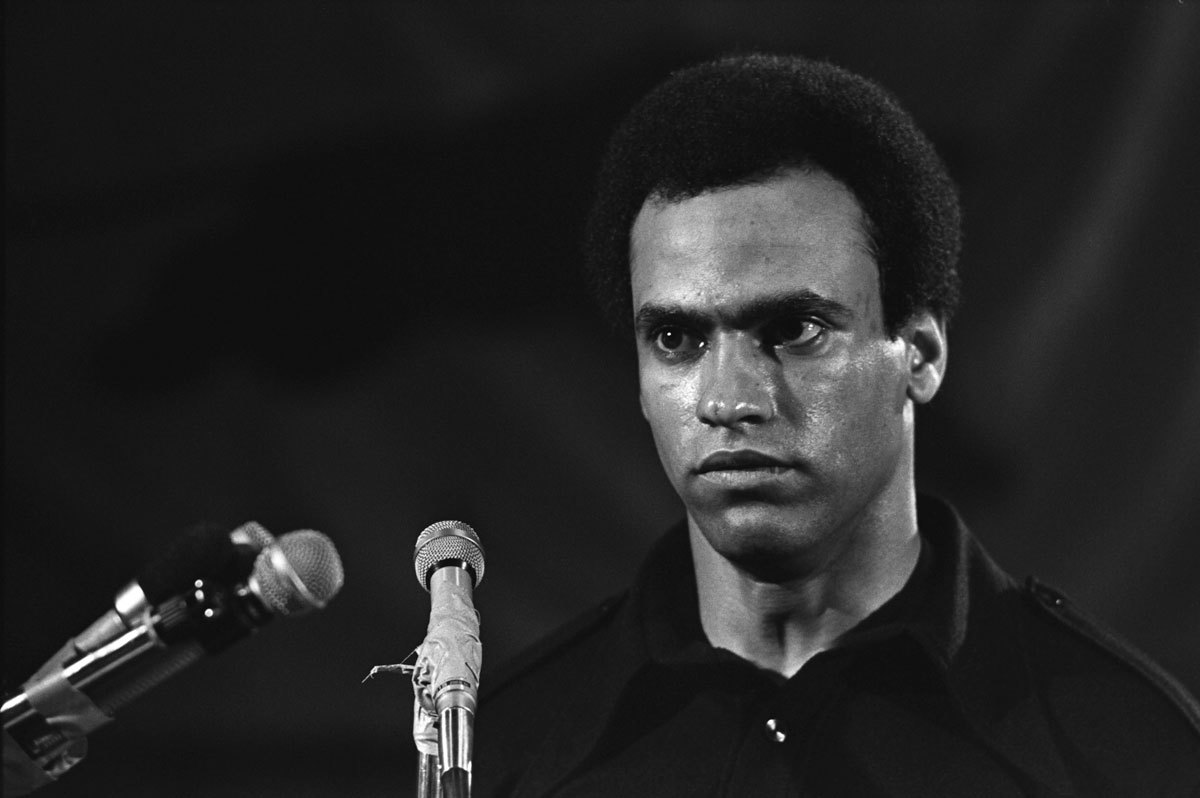
The appearance of Welles in the film's visual collage is representative of the approach Mr. Indirectly, the film suggests that Newton, whose life was troubled to the end - another murder charge in 1974, which was dismissed after two mistrials a gun conviction, for which he served nine months in jail in 1987 and his death at 47, shot in the head in an Oakland street - was ''a gangster with a conscience,'' a phrase used by Orson Welles to describe Macbeth in a clip from ''The Steve Allen Show.''

The actor chain-smokes, repeats odd phrases with manic intensity and reveals the physical degeneration caused by Newton's cocaine addiction through the constant twitching of his right leg. Smith's performance captures Newton's own self-consciously crafted performance in the role of incendiary black revolutionary. They double as Newton's followers (some of them wear the black beret of the Panthers) and also stand in for the television viewers trying to make sense of Newton's elusive identities: killer, poet, con man, visionary, lost soul. Smith in nearly every shot, rising above the stage on three sides. They are visible, in silhouette, behind Mr. Lee's film, the audience takes on the role of spectators in an operating theater, intent on dissecting Newton's persona down to the raw bone. The charges were dismissed after two more trials ended in hung juries. Demonstrators around the country rallied to ''Free Huey,'' until his conviction was overturned, on a technicality, in 1970. Newton, who was also shot, said he was unconscious when the officer was killed, but he was convicted of manslaughter. In 1967 Newton was charged with murder when a traffic stop led to a scuffle and the shooting of an Oakland policeman. ''The two things foremost in the black militant's mind are sex and money,'' said an internal F.B.I. At the same time, law enforcement agencies branded the group as amoral and dangerous. Charges of police brutality spurred wealthy liberals to raise money for the Panther defense fund, giving rise to the concept of radical chic. The party, like Newton, embodied America's contradictory attitudes to race.
#HUEY P. NEWTON CELEBRITY BLACK PANTHERS FREE#
Newton founded the Black Panther Party with Bobby Seale in Oakland, Calif., in 1966, combining socialism and black nationalism (and students and ex-convicts) in a group that ran free schools and clinics and also marched onto the floor of the California Assembly carrying rifles and shotguns. People will learn a lot about a complex man who was really trying to get at the so-called democracy that this country's supposed to be about.'' Lee, sitting in his Madison Avenue office beneath a framed set of Malcolm X postage stamps. ''I try to stay away from boxing things into categories of fiction and nonfiction,'' said Mr.

Smith's performance, which was filmed in front of an audience in a synagogue on the Lower East Side of Manhattan. Lee's rendition further complicates the question of genre, inserting newsreel clips of protest marchers and Newton's contemporaries - from Martin Luther King and Marlon Brando to William F. Lee's television version, which had its premiere on the Black Starz premium cable channel in June, lies halfway between documentary and fiction - fitting for a man who repeatedly fictionalized his life story for public consumption. Smith's play was first presented in New York by the New York Shakespeare Festival in 1997.

The film is Spike Lee's video adaptation of Roger Guenveur Smith's Obie award-winning one-man show about Newton, a drug addict with a Ph.D., a black activist twice charged with murder and one of the most charismatic and controversial figures in the black power movement.īased on Newton's speeches, autobiographical writings and tape-recorded conversations, Mr. 17), is a work that defies categorization.

to commemorate the 60th anniversary of his birth (on Feb. Newton Story,'' which will be broadcast by PBS on Wednesday at 9 p.m. NEWTON spent much of his life trying to escape the constricting labels of ''hero'' and ''criminal'' affixed to him by both political friends and political enemies.


 0 kommentar(er)
0 kommentar(er)
